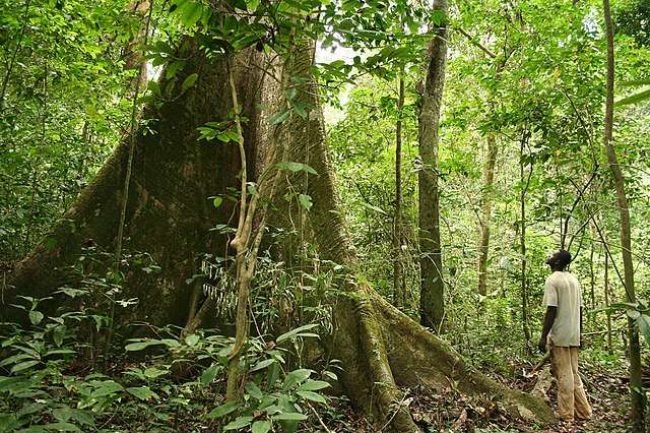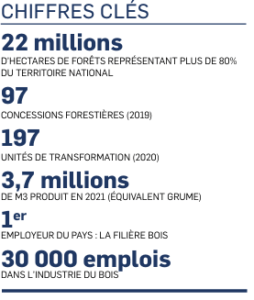Space not available
Please select an ad format
The file format is not recognized
Click here to download an ad
Click here to download an ad
Here you can drag and drop or upload an ad
Send the ad up to 8 days after payment
A link will be sent to you by contact@via-agency.media
Position
Reserved space
Announcement transmitted
Reference

The forestry and timber sector has strong economic potential and is capable of creating wealth and enabling fair, equitable, inclusive, and sustainable economic and social development. The stated objective is to promote the industrialization of the timber industry, the country's largest private employer.
Space not available
Please select an ad format
The file format is not recognized
Click here to download an ad
Click here to download an ad
Here you can drag and drop or upload an ad
Send the ad up to 8 days after payment
A link will be sent to you by contact@via-agency.media
Position
Reserved space
Announcement transmitted
Reference
The Forest Code mandates the management of allocated forest concessions, as well as the processing of timber. It also provides for three types of forest permits: the Sustainable Forest Management Concession (CFAD), the Associated Forest Permit (PFA), the Over-the-Counter Permit (PGG), and Community Forests (UFIGA, 2020). In 2019, there were 51 Community Forests under a Final Agreement covering an area of 259,883 hectares. While there were 41 under a Provisional Agreement covering an area of 113,454 hectares, there were 97 forest concessions in the same year, including 12,739,939 hectares under forest management (UFIGA, 2020).
 Industrial production is very clearly dominated by sawn timber with more than 70% of production but Gabon stands out from other countries in the sub-region by its relatively high plywood/veneer production. Gabon is in the top 5 global exporters of tropical wood veneer. The number of wood processing units increased from 82 factories in 2009 to 162 factories in 2018. This trend continued with the installation of other processing units, bringing the total number to 197 units in 2020 with 70 units located in the Nkok Special Economic Zone (SEZ). This area, which employs nearly 10,000 people, has helped increase the production capacity of Gabon's timber industry and strengthen its international position through the processing of products that meet international quality standards and are 100% made in Gabon.
Industrial production is very clearly dominated by sawn timber with more than 70% of production but Gabon stands out from other countries in the sub-region by its relatively high plywood/veneer production. Gabon is in the top 5 global exporters of tropical wood veneer. The number of wood processing units increased from 82 factories in 2009 to 162 factories in 2018. This trend continued with the installation of other processing units, bringing the total number to 197 units in 2020 with 70 units located in the Nkok Special Economic Zone (SEZ). This area, which employs nearly 10,000 people, has helped increase the production capacity of Gabon's timber industry and strengthen its international position through the processing of products that meet international quality standards and are 100% made in Gabon.
Space not available
Please select an ad format
The file format is not recognized
Click here to download an ad
Click here to download an ad
Here you can drag and drop or upload an ad
Send the ad up to 8 days after payment
A link will be sent to you by contact@via-agency.media
Position
Reserved space
Announcement transmitted
Reference
Exported industrial production volumes are dominated by the sawmill segment: more than 851,000 tons of sawn timber produced in Gabon is exported. The timber sector experienced a boom following President Ali Bongo's decision in November 2009 to ban the export of logs in order to encourage investors in the sector to undertake initial processing on site. The reforms launched under the PAT will help transform this sector while ensuring the preservation of the forest. From 2022, the government will make it mandatory to trace all trees cut on Gabonese soil to ensure clean and responsible logging.
Before the decision to ban log exports, forest product exports were largely dominated by logs, mainly to Asian countries. Currently, more than 40% of wood product exports are destined for China. Europe imports approximately 30% of industrial production. As part of forest certification and FSC standards, companies are required to reforest each time they cut timber. Regarding logistics infrastructure, Gabon has two main ports for timber exports: the port of Port-Gentil and the port of Owendo near the capital, Libreville. The country also has Customs Sites, used for the transport of forest products to the port of Owendo. These are the Franceville dry port, the Lastourville Hub, and the Nkok SEZ, which is an SEZ with a One-Stop Shop.
Gabon aims to build a sustainable economy. To achieve this goal, the country aims to successfully develop 200,000 hectares of fast-growing tree plantations by 2025 to feed the appetite of its timber industry. The project is in line with local ambitions for timber industry development, which in the medium term underpin the creation of specialized economic zones in Lambaréné and Franceville, and the sustainable economic plantation project. Projects such as the one developed in Souba, in Haut Ogooué, where a eucalyptus nursery is currently being developed, offer an alternative to exploiting timber species for economic needs.
The diversification of the economy and its competitiveness will be achieved through resilient mechanisms. This is one of the objectives of the Transformation Acceleration Plan (PAT), which projects the development of these 200,000 hectares of fast-growing tree plantations by 2025.
Space not available
Please select an ad format
The file format is not recognized
Click here to download an ad
Click here to download an ad
Here you can drag and drop or upload an ad
Send the ad up to 8 days after payment
A link will be sent to you by contact@via-agency.media
Position
Reserved space
Announcement transmitted
Reference







